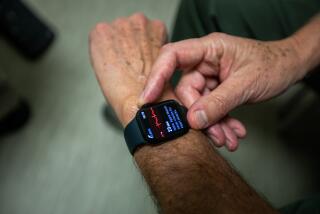THE GROWING JAPANESE DOMINANCE OF THE U.S. MICROCHIP MARKET : ITC Rules U.S. Chip Firms Hurt by Japan
WASHINGTON — American makers of 256K RAM semiconductors, a standard “memory chip” for computers and a host of other electronic devices, probably were damaged by price-cutting competition from Japanese firms that now control about 60% of the U.S. market, the International Trade Commission ruled Wednesday.
The preliminary ruling is widely expected to lead this fall to the imposing of “dumping” penalties on the Japanese, who are accused of selling the advanced chips in the United States for as little as half of their production cost.
The ITC’s finding of injury permits the Commerce Department--which filed the chip-dumping complaint last month against 30 Japanese manufacturers--to calculate the extent to which the firms sold their chips below cost. If the ITC reaffirms its initial finding this summer, import duties could be imposed against the Japanese to make up any unfair-pricing losses suffered by American firms.
Blunt Signal
In the semiconductor industry--one of the sorest spots in the bruised trade relations between the United States and Japan--the Reagan Administration’s decision to file the dumping complaint itself was seen as an unusually blunt signal of unhappiness.
Wednesday’s ITC decision “strongly suggests (that) our government believes there is sufficient evidence to warrant prompt, direct action” against the Japanese, said the Semiconductor Industry Assn., whose 60 members compose the bulk of the country’s independent chip makers.
The vice president of one U.S. maker of the 256K chips, Micron Technologies of Boise, Ida., called the ruling “significant in the sense that there is now a broader understanding that there is a serious problem with Japan--not just on trade issues but with the tactics they are using to take advantage of the U.S. market.”
The official, Larry Grant, called the 256K chip dispute a “skirmish” in an emerging U.S.-Japan battle for control of the worldwide computer market.
“It’s only going to be a short period of time before you see the same types of problems arise in computers,” he said. “Today you’re talking about Micron’s problems, but tomorrow you’re talking about IBM’s.”
Staples of Industry
The ITC ruling centers on 256K RAM semiconductors--”random access memory” chips that can store about 256,000 bits of information and are staples of computers and other electronic memory devices. In word-processing networks, for example, RAM chips save information before it is transferred to floppy or hard disks for more permanent storage.
The worldwide market for all types of RAM chips totaled about $1.65 billion last year, with $724 million of those sales in the United States, according to Dataquest Inc., a Silicon Valley market analysis firm. In dollars, Dataquest estimated, U.S. makers netted 39% of 1985 sales and Japanese makers 60%--more than double their 27% share in 1980. The remaining 1% was captured by other foreign makers.
Last year, $340 million of 256K RAM chips were sold in the United States, Dataquest said, with the Japanese capturing 83% of sales. That huge slice was smaller than in 1984, when the Japanese took 90% of the $360-million domestic market for the chips.
Dataquest analyst Lane Mason said the Japanese share dropped last year because two U.S. makers introduced new versions of the chips.
Only four U.S. companies make the 256K chips, and two of those firms--IBM and AT&T--manufacture; them primarily for their own computers and not for the retail market. Industry officials say that several other American firms have been forced out of the business, unable to match competitors’ prices.
An ITC spokesman said the finding of injury to U.S. chip makers will be applied not only to the 256K chip market but to the emerging market for 1-million-bit chips now being developed by several U.S. and Japanese manufacturers.
While U.S. companies have bemoaned the Japanese firms’ price cutting, it has been unclear how much of the discounting has occurred because of unfair trading tactics and how much can be blamed on a worldwide depression in microchip sales.
Prices Have Plummeted
Measured in dollar sales, the American market for the devices shriveled by more than 50% last year alone. Commerce Secretary Malcolm Baldrige, head of a White House strike force probing unfair trade practices, said in December that individual chip prices plummeted from $20 to less than $2 last year. U.S. industry experts contend that the chips cost Japanese firms about $3 each to produce.
The unanimous ITC decision is the third ruling in two months against Japanese chip makers. The Commerce Department recently imposed temporary dumping duties against 64K RAM chips, and the ITC has tentatively ruled that import competition in the market for EPROMs, or erasable-memory chips, is damaging U.S. firms.
In addition, the Semiconductor Industry Assn. has filed a general complaint against the Japanese, contending that the nation’s policy of dumping excess chips in the United States while protecting its own markets warrants reaction by this country.
U.S. and Japanese representatives are negotiating a truce in the chip wars, and the Japanese proposed last month that the two nations essentially fix prices for some strategic kinds of chips. The U.S. rejected that proposal but said it offered a basis for further talks.






